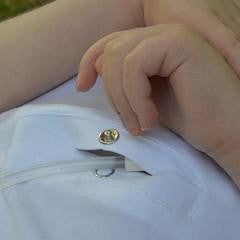
Why Some Children Need to be Tube Fed & Tips to Help You Cope
Tube feeding, or enteral nutrition for children can be required for a number of reasons, either because of an illness or condition a child has, or to aid growth and development. And, with Feeding Tube Awareness Week upon us, we thought we would share a few tips on tube feeding children.
Before we get to those tips though, here are some details on those illnesses and conditions or other reasons, that are most likely to require long-term, though not necessarily life-long, tube feeding.
 Pre-Term Births Needing Feeding Tubes
Pre-Term Births Needing Feeding Tubes
Premature babies who are born at less than 36 weeks of gestation often require to be fed via a tube. That’s because their sucking reflex isn’t always as fully developed as it needs to be in order to take in the milk that’s essential for them to grow, develop and thrive.
Congenital Heart Defects
Children born with heart defects who require surgery early in life are another group of babies who may require to be tube fed. The reason here isn’t because they can’t feed, rather, it’s because they need to be strong enough to cope with the surgery they require. Tube feeding can help make sure they’re getting all the nutrients they need to sustain them through the surgery they will undergo.
Genetic Syndromes
Children born with some genetic syndromes, including Down Syndrome, Costello Syndrome, Rett Syndrome and many more, can be affected in ways that require tube feeding. The need for Enteral Feeding can be due to one or a number of reasons associated with those syndromes. Each child is different, with their own individual needs.
Renal Problems
Children with kidney or renal problems can also require tube feeding. This can be because their bodies are unable to process the protein their bodies need, in the usual way.
Tips for Tube Feeding Your Child
Unfortunately, there are many more illnesses, conditions and reasons why some children require enteral feeding. With that in mind, here are just a few tips to help parents and carers of children who need to be tube fed, to help make sure they’re getting the food and nutrients they need.

Try and be Patient when Feeding
Tube feeding a young child is hard for them and for you, the parent. It takes time for everyone to get used to it and you will make a few mistakes. But, with some patience and perseverance – sometimes months of it – you will get tube feeding right and you and your child will benefit.
Be organised and Schedule Meal Times
Once the feed on demand days are over, meal times are generally scheduled affairs, particularly when it comes to children, so why should tube feeding be any different? Make sure you schedule plenty of time for each enteral feed to make sure you’re not rushing or feeling under pressure. That way you’ll have time to deal with any problems that occur without panicking and making mistakes or upsetting your child.
When Asked About Feeding Tubes, Keep Explanations Short and to the Point
If your child is older when they start tube feeding, or you have other older children who are asking questions, address those questions calmly and with straightforward answers. Tell them their brother or sister’s tummy or throat isn’t working properly and they need to be fed this way to make sure their body gets all the right vitamins and nutrients. It can feel frustrating having to say the same thing over and over again to curious friends and family. But, by keeping it brief and simple, they are more likely to understand and you shouldn’t have to repeat it too often.

Remember You Are Doing This to Help Your Child
It’s not your fault your son or daughter need enteral nutrition and it’s not theirs either. You’re both learning how best to manage the process together, to help your child get everything they need to grow and develop and in many cases, eventually lead a healthy life without tube feeding. You’ll find a way to make it work and it will get easier.
Useful Resources:
http://www.feedingtubeawareness.org/wp-content/uploads/2015/05/ParentGuide.pdf
http://www.feedingtubeawareness.org/
http://pediatricfeedingnews.com/


 Pre-Term Births Needing Feeding Tubes
Pre-Term Births Needing Feeding Tubes